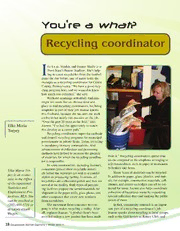
ERIC EJ912041: You're a "What"? Recycling Coordinator PDF
Preview ERIC EJ912041: You're a "What"? Recycling Coordinator
You’r e a what? Recycling coordinator I t’s 6 a.m. Sunday, and Joanne Shafer is at Penn State’s Beaver Stadium. She’s help- ing to count recyclables from the football game the day before, one of many tasks she manages as a recycling coordinator for Centre County, Pennsylvania. “We have a good recy- cling program here, and we wanted to know how much was collected,” she says. Weekend mornings at football stadiums might not seem like an obvious time and place to find recycling coordinators, but being adaptable is part of their job. Joanne knows this firsthand, because she has seen the work evolve in her nearly two decades on the job. “Over the past 20 years in the field,” says Elka Maria Joanne, “I’ve had the opportunity to watch Torpey this develop as a career path.” Recycling coordinators supervise curbside and dropoff recycling programs for municipal governments or private firms. Today, recycling is mandatory in many communities. And advancements in collection and processing methods have helped to increase the quantity from it.” Recycling coordinators spend time of materials for which the recycling coordina- on the computer or the telephone arranging to tor is responsible. sell commodities, such as paper or aluminum, In some communities, including Joanne’s, to brokers and firms. consumers presort their recyclable materi- Elka Maria Tor- als before the materials are sent to a transfer Many types of materials can be recycled. pey is an econo- station or processing facility. In others, all In addition to paper, glass, plastics, and met- mist in the Office recyclables are collected together and then are als, for example, construction materials, cell of Occupational sorted at the facility. Both types of process- phones, and printer cartridges can all be col- Statistics and ing facilities prepare the sorted materials for lected for reuse. Joanne also helps coordinate Employment Pro- shipment to the paper mills, glass plants, and collection of hazardous waste by organizing jections, BLS. She other companies that create new products special collection days and making the public can be reached at from recyclables. aware of them. (202) 691-5719 or The movement from consumer to com- In fact, community outreach is an impor- at torpey.elka@ pany is what makes recycling a reality. After tant part of a recycling coordinator’s job. bls.gov. all, explains Joanne, “a product hasn’t been Joanne speaks about recycling to local groups, recycled unless a new product has been made such as the Girl Scouts or Rotary Club, and 28 Occupational Outlook Quarterly • Winter 2010–11 Photos of Joanne Shafer courtesy of Centre County Solid Waste Authority works with businesses to do waste assess- ments and to train employees about proper recycling methods. “I’ve worked with every- one from preschoolers to the elderly,” she says. “It helps to relate what you do to the big picture. I can show people that we removed the equivalent of 68,000 cars from the road or saved enough energy to power 28,000 house- holds.” As a recycling coordinator, Joanne is responsible for about 60 employees who col- lect recyclables and run the recycling process- ing facility in her county. Her personnel duties include coordinating collection schedules and assigning workers to the pickup routes. Each recycling coordinator’s job is a little different, depending on the size of the program he or she oversees. A coordinator in recycling coordinators must be certified; in charge of a small program, for example, might Opposite page, Joanne others, optional certification is available. go out on a recycling truck for collection or Shafer examines operate a forklift in the processing facility. Work experience is also important for materials for recycling. Recycling coordinators for large programs recycling coordinators. Jobs in municipal gov- perform more administrative duties, such as ernment, manufacturing, education, person- Above, she discusses managing contracts and budgets. nel management, or marketing provide good program details with a preparation. Volunteer or internship experi- Data management skills, including the use local citizen. ence with a local recycling program or private of basic software programs, come in handy waste management company is another way to for administrative tasks. Coordinators evalu- gain practical knowledge. ate the success of their program by analyzing information ranging from recycling rates to The U.S. Bureau of Labor Statistics does financial stability. not collect employment or wage data for recy- Communication skills are essential. In cling coordinators. In 2009, first line supervi- addition to speaking to the public, recycling sors/managers of helpers, laborers, and mate- coordinators create brochures and marketing rial movers (the occupational title under which material and write grant proposals, reports, recycling coordinators falls) earned a median and other documents, such as employee annual wage of $42,940. Anecdotal evidence handbooks. Joanne also writes requests for suggests that annual earnings for recycling proposals to hire specially trained contractors coordinators range from the low $30,000s to who can help handle and transport hazardous as much as $100,000, depending on a recy- waste. cling program’s size, the worker’s experience, Requirements for becoming a recycling and other factors. coordinator have changed in the two decades For recycling coordinators, the passion since Joanne started. Joanne doesn’t have a for what they do is often a greater reward than college degree, and her background is in hotel, the paycheck they get for doing it. “I have the restaurant, and institutional management. opportunity to do something that makes a But most entry-level recycling coordinators difference,” says Joanne. “I love watching fifth today need at least a bachelor’s degree in a graders come in and say, ‘That’s cool. I’ll tell field related to recycling, such as environmen- my mom not to throw that out.’ And then to tal resources management or environmental tie it in with reducing greenhouse gas produc- education. In some States, such as New Jersey, tion—that’s very important to me.” Winter 2010–11 • Occupational Outlook Quarterly 29
